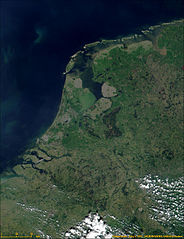 |
| The Netherlands (Wikimedia) |
"The Netherlands, Berlin's most important ally in pushing for greater budgetary discipline in Europe, has fallen into an economic crisis itself. The once exemplary economy is suffering from huge debts and a burst real estate bubble, which has stalled growth and endangered jobs.
"Underwater" is a good description of the crisis in a country where large parts of the territory are below sea level. Ironically, the Netherlands widely viewed as a model economy, is facing the kind of real estate crisis that has only affected the United States and Spain until now. Banks in the Netherlands have also pumped billions upon billions in loans into the private and commercial real estate market since the 1990s, without ensuring that borrowers had sufficient collateral.
.....More than a decade ago, the Dutch central bank recognized the dangers of this euphoria, but its warnings went unheeded. Only last year did the new government, under conservative-liberal Prime Minister Mark Rutte, amend the generous tax loopholes, which gradually began to expire in January. But now it's almost too late. No nation in the euro zone is as deeply in debt as the Netherlands, where banks have a total of about €650 billion in mortgage loans on their books.
.....Consumer debt amounts to about 250 percent of available income. By comparison, in 2011 even the Spaniards only reached a debt ratio of 125 percent.
The Netherlands is still one of the most competitive countries in the European Union, but now that the real estate bubble has burst, it threatens to take down the entire economy with it. Unemployment is on the rise, consumption is down and growth has come to a standstill. Despite tough austerity measures, this year the government in The Hague will violate the EU deficit criterion, which forbid new borrowing of more than 3 percent of gross domestic product.
.......... The Dutch have long been among Europe's most diligent savers, and in the crisis many are holding onto their money even more tightly, which is also toxic to the economy. "One of the main problems is declining consumption," says Johannes Hers of the Netherlands Bureau for Economic Policy Analysis (CPB) in The Hague, the council of experts at the Economics Ministry.
His office expects a 0.5-percent decline in growth for 2013. Some 755 companies declared bankruptcy in February, the highest number since records began in 1981. The banking sector is also laying off thousands of employees at the moment.
Because of the many mortgage loans on the books, the financial industry is extremely inflated, so much so that the total assets of all banks are four-and-a-half times the size of economic output.
Not a very uplifting article. However, I recently attended a presentation by one of the leading Dutch banks, ABN AMRO Bank, on the developments of the Dutch economy. They confirmed 2013 to be a difficult year, but forecasted export-led improvements starting in 2014. Time will tell how this will unfold.
No comments:
Post a Comment